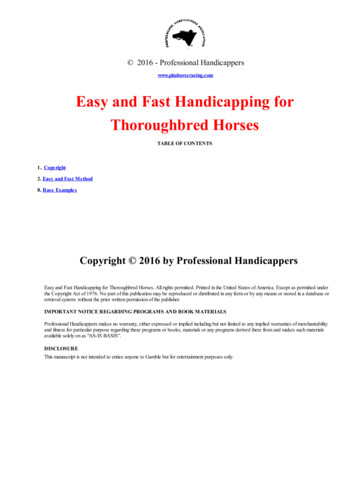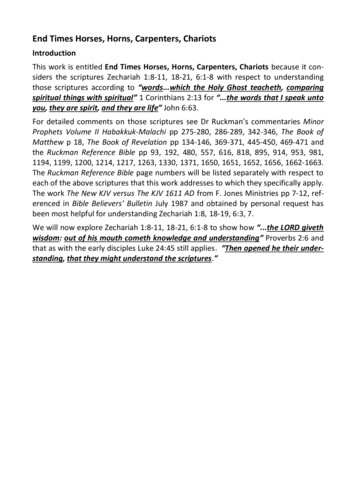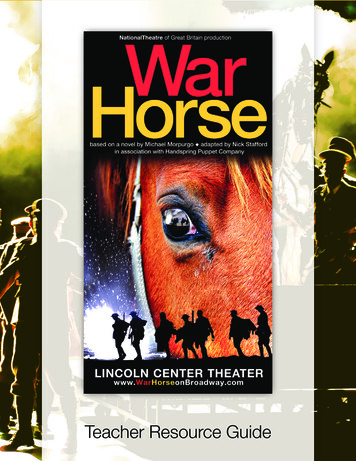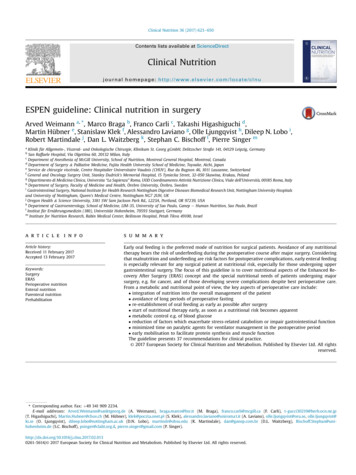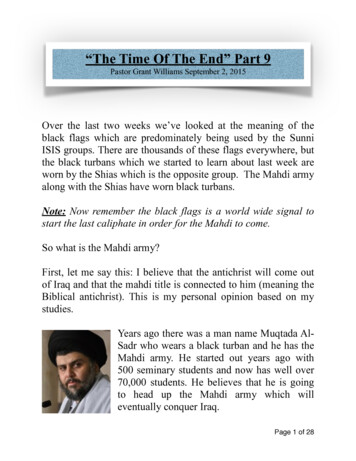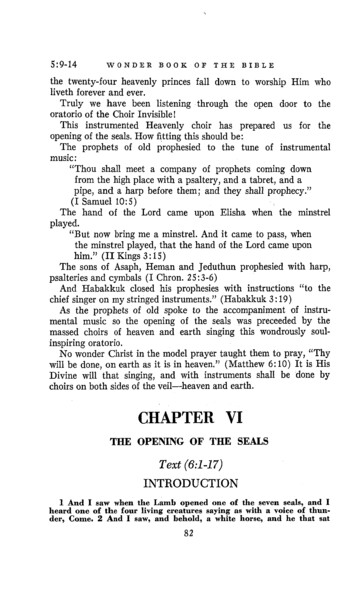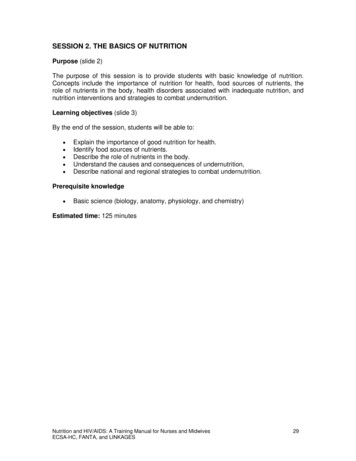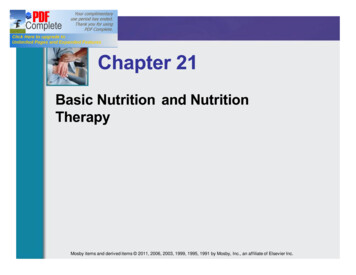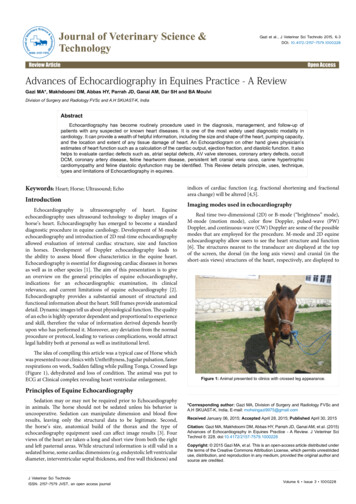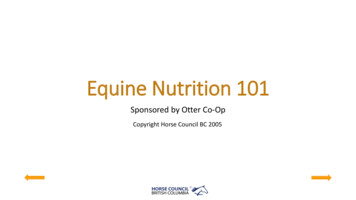
Transcription
Equine Nutrition 101Sponsored by Otter Co-OpCopyright Horse Council BC 2005
Nutrition Requirements for HorsesThere are five basic things that a horse requiresand that a horse owner will need to supply aspart of a horse’s diet: Water Energy (carbohydrate fat) Protein Vitamins MineralsCopyright Horse Council BC 2005
Basic Nutrients - Water Water is the single most important thing in a horse's diet. A loss of 10% ofthe body's water in a horse is devastating to a horse’s health. Water actsas a coolant, helps with many of the chemical reactions in a horse's bodyand is critical for maintaining blood pressure. A horse's water requirement can more than double during exercise inhot/humid weather. Failure to provide continuous access to water is aprime cause of colic.Rule: always offer good clean water, free choice and when possible havethe water temperature between 7 – 24 degrees Celsius to ensureoptimum water consumption.Copyright Horse Council BC 2005
Basic Nutrients - Quiz 1Why is water so important is a horse's diet? Water acts as a coolant Acts to maintain blood pressureTrueTrueFalseFalse Helps in many chemical reactions True FalseCopyright Horse Council BC 2005
Basic Nutrients - Quiz 1 AnswersAll True!Water acts as a coolant, helps with many of the chemicalreactions in a horse's body and is critical for maintaining bloodpressure.Copyright Horse Council BC 2005
Basic Nutrients - Energy Energy is the fuel that allows the heart to beat, muscles to work, foals to growinside pregnant mares, mares to produce milk and stimulates growth in younghorses. Energy is not a nutrient however a horse gets energy from the digestion ofcarbohydrates, fats and proteins that are contained in the feeds that they eat. Energy is one of the main focuses of any horse's diet because we can visually seewhen we are feeding too much or too little by the condition of the horse. If horsesare fed too much energy, they will gain weight, while horses that are not fedenough energy will loose body weight. Approximately 80-90% of the feed that a horse eats is used to meet its energyrequirement.Copyright Horse Council BC 2005
Basic Nutrients - CarbohydratesThe following are the main sources of energy in a horse's diet: Carbohydrates are one of the primary sources of energy for any horsebecause approximately 75% of the plant material that a horse eats is made upof carbohydrates. Carbohydrates are broken into two basic groups structuraland nonstructural. Structural carbohydrates come from plant fiber (forages,) bacteria in theintestines digest only about 50% and the remainder is passed out in themanure. Horses require a minimum of 1% of body weight in forage. Nonstructural carbohydrates come primarily from the grains that wefeed. They are in the form of starches, sugars and pectin. The mostimportant nonstructural carbohydrate is starch and is a highly digestibleenergy source that is provided in grains like oats, corn & barley.Remember horses are limited to the amounts of nonstructuralcarbohydrates that they can handle.Copyright Horse Council BC 2005
Basic Nutrients - Fats and Proteins Fats are an excellent source of energy for horses and highlydigestible. In fact fat sources provide two to three times moredigestible energy than similar quantities of grains. Fat sources comein both liquid (vegetable oils) and solid (rice bran & dry fat). Bothwill work well, solids are a little easier to feed. Protein can also be a source of energy in a horse's diet but onlywhen we feed more than the horse's daily protein requirement.Protein is not a very effective source of energy due to the high costof protein ingredients like alfalfa and soyabean meal etc. Horsesthat are fed inadequate energy will use feed protein and bodyprotein (muscle) to meet their energy needs. Don't short changeyour horse the energy it requires.Copyright Horse Council BC 2005
Basic Nutrients - ProteinThe following is a guideline for total protein requirements:Mature Horses8-12%Pregnant Mares10-12%Lactating Mares13-14% (extra protein needed for milk production)Weanlings14-16% (high protein required for growth tissueand lower consumption levels than mature horses)Yearlings13-14%Copyright Horse Council BC 2005
Basic Nutrients - Protein3. Proteins Proteins are made up of amino acids that are the building blocks ofhair, hoof, skin, muscles and blood cells. If your horse suffers fromhoof, skin or coat problems it may be caused by a lack of protein inthe diet. Quality of protein can contribute to a lack of protein. So before youpurchase a fancy supplement to fix the problem, balance theprotein in your horse's diet. Horses that receive adequate protein in their diets are able toobtain all the essential and nonessential amino acids that theyrequire from the feed and will help them digest fibre and turn itinto energy. Protein needs for horses will vary depending on ageand activity level of each horse.Copyright Horse Council BC 2005
Basic Nutrients - Protein Studies have shown that feeding modest excesses ofprotein isn't really harmful to a horse's health and will notcause a horse to have large swings in energy however itmay be a waste of money. Excess protein is passed in thehorse's urine. Large excesses of protein may causemetabolic and digestive problems that can include largeamounts of ammonia in the urine and when left untreatedin confined spaces this can cause respiratory problems. It is important to remember that the protein level in a feeddoes not equal energy as factors such as the quality of theforage and quality of the protein sources will all impact thedaily protein needs of a horse. A horse will derive most ofits energy from carbohydrates and fats and not from theprotein in its diet.Copyright Horse Council BC 2005
Basic Nutrients - Quiz #21. What are the sources of energy for a horse?2. What are the two basic groups of carbohydrates?3. Name the sources of each type of carbohydrate?Copyright Horse Council BC 2005
Basic Nutrients - Quiz #2 Answer1. Energy is produced from the digestion ofcarbohydrates, fats, and proteinscontained in the feeds that horses eat.2. The two basic types of carbohydrates arestructural found in plant fiber andnonstructural3. Carbohydrates found in primarily grains.Copyright Horse Council BC 2005
Basic Nutrients - Vitamins Vitamins are needed for all normal metabolic functions in a horse's body and are dividedinto two classes, fat-soluble and water-soluble. Horses are able to obtain most of the vitamins that they require from their diet, theirown body stores and from the bacteria that synthesize B-complex vitamins in thedigestive tract. Exceptions would be horses under stress, brood mares, performance horses, younggrowing horses and senior horses all may require supplemental vitamins. Feeding a well fortified manufactured feed formulated in B.C. should fill in any vitamingaps that exist in a horse diet. Remember to follow the manufacturer's feedingguidelines.Copyright Horse Council BC 2005
Basic Nutrients - Fat-Soluble VitaminsFat-soluble vitamins include vitamins A, D and E. These are stored in the in thefat reserves of a horse’s body. Green pasture is rich in fat-soluble vitamins butforage that has been stored for some time will rapidly lose these vitamins.Vitamin A helps maintain health in cells that relate to skin, eyes and digestivetract as well as reproductive and immune systems as well as normal vision. Green forage is an excellent source of vitamin A but additionalsupplementation is usually required. Generally deficient in unfortified feedsand usually needs to be supplemented through fortified feeds and orcomplete supplements.Vitamin D helps with growth and bone development. Very rare to have adeficiency in horses as they produce their own vitamin D when exposed tosunlight. Stabled horses and horses during the winter when sunlight exposure islow can benefit from added Vitamin D.Vitamin E is very important for immune, nervous system and muscle functions,reproduction, muscle development, red blood cells and other chemicalfunctions in a horse's body. Vitamin E is an antioxidant and is rapidly lost from stored forages andprocessed grains like COB. Recent studies have shown that supplementationis essential for all horses.Copyright Horse Council BC 2005
Basic Nutrients - Water Soluble VitaminsWater-soluble vitamins like vitamin C and B-complex vitamins can not be stored for longperiods of time because of the lack of a place to store them in a horse's body.B-Complex vitamins are generally not deficient in horses as they are produced in largeamounts by bacteria in the large intestine. Freshness of forages and fortified feeds iscritical to prevent oxidation of vitamins. High quality fortified horse feeds are supplemented with B-complex vitaminsincluding biotin to ensure horses that may be getting marginal or reduced forageget enough to meet their requirements.Vitamin C - No deficiencies or toxicities have been reported in horses because they canmanufacture what they require.Copyright Horse Council BC 2005
Basic Nutrients - Quiz #31.Vitamins are divided into two classes, what are these classes?2.What are some examples of the vitamins in each vitaminclass?Copyright Horse Council BC 2005
Basic Nutrients - Quiz #3 Answers1. Vitamins are divided into two classes, what are these classes?Fat Soluble and Water Soluble2. What are some examples of the vitamins in each vitamin class?Fat : Vitamin A, D and EWater: Vitamin B Complex and Vitamin CCopyright Horse Council BC 2005
Basic Nutrients - Minerals (Ash)Minerals (Ash) are inorganic and unlike vitamins cannot beproduced by a horse and so need to be provided in ahorse's diet. Levels of minerals vary in forages and unfortifiedgrains depending on the soil where they were grown. It is important to remember that over fortification ofminerals can be worse than too little. Correctfortification is essential! So buy feeds that areformulated and manufactured for your region anddon’t dilute them with unfortified grains.Copyright Horse Council BC 2005
Basic Nutrients - Macro MineralsMacro Minerals (needed in a diet in larger quantities) and include the followingimportant minerals: Calcium is required for development of bone and for muscle and nervefunctions as well as blood clotting. Although maintaining an optimum Calcium : Phosphorous balance of 2parts calcium to 1 part phosphorus (2 : 1) is important a range up to a 3 : 1or more would not be harmful, more important is meeting the minimumcalcium requirement level for the age and activity level of your horse. Manyof the forages produced in B.C. are deficient in calcium. Magnesium is added to feeds and is required by enzyme functions that arecritical for the production of energy. Magnesium is another mineral that is generally found to be deficient in B.C.forages. Excess calcium can interfere with magnesium utilization.Copyright Horse Council BC 2005
Basic Nutrients - Macro Minerals Phosphorous is required for the development of theskeleton and for other metabolic functions. Levels ofphosphorous are closely related to the availability ofcalcium to a horse. Extremely high levels of phosphorousin a diet can tie up the calcium making it unavailable to thehorse. Fortified feeds have been formulated to balance thecalcium and phosphorous levels. Some common feedstuffs that are fed that are high in phosphorous andcause Ca:P imbalances are wheat bran, unbalancedrice bran and most grains. As an example C.O.B. (corn,oats, and barley) has not been balanced and containshigh levels of phosphorous and if fed needs to bebalanced using a supplemental product. Vitamin D isa vitamin that helps horses to use the calcium andphosphorous in their diets.Copyright Horse Council BC 2005
Basic Nutrients - Micro MineralsMicro Minerals are needed in a diet in very small quantities. Included arethe following minerals sometimes known as trace minerals: Copper is a mineral that is involved in blood and bone production andskin pigmentation. Copper is related to the absorption of iron, zinc andother trace minerals. Recent studies have shown that feeds that contain supplementalcopper levels when fed to pregnant mares have shown a reductionof OCD (osteochondrosis) in the foals. Copper also helps red blood cells carry adequate oxygen.Copyright Horse Council BC 2005
Basic Nutrients - Micro MineralsIron is very important for transport of oxygen by the redblood cells. Deficiencies are not common but too much ironcan cause other minerals not to be absorbed by the body.Zinc is important for skeletal development, reproductionand also the strengthening of the immune system. Horsesthat are fed only forages may have marginal levels of zinc.Zinc is a very important mineral for foals and younggrowing horses.Copyright Horse Council BC 2005
Basic Nutrients - Micro MineralsSelenium is associated with normal immune and muscle functions. Selenium isgenerally deficient in British Columbia therefore fortified feeds and supplementsformulated and produced in B.C. are generally fortified with adequate levels tocompensate for lack in the forage.Caution: Many areas of North America do not have selenium deficiencies and sofeeds and supplements that are formulated and produced elsewhere may not haveadequate levels.Also be aware that feeding supplemental selenium on top of feed that containsselenium, salt with selenium and vitamin / mineral supplements with selenium mayresult in a toxicity problem.Proper Vitamin E levels in a diet along with selenium work together to preventimmune and muscle problems.Copyright Horse Council BC 2005
Basic Nutrients - Quiz #4Minerals are important in horse’s diet and must beprovided in feeds, as a horse does not produceminerals.What are the two important classifications of minerals?Copyright Horse Council BC 2005
Basic Nutrients - Quiz #4 AnswersMacro minerals are needed in large quantities in the diet and micro ortrace minerals are needed in much smaller quantities.Copyright Horse Council BC 2005
Basic Nutrients - ElectrolytesElectrolytes are macro minerals that will conduct electricity whendissolved in water. These have great effect on normal function of musclesand nerves helping the electrical activity that is occurring in a horse. Salt when offered free choice daily along with a good supply of waterwill ensure that the average horse is getting enough electrolytes in itsdiet. Loose salt works better for horses than blocks to increase the intakelevel. Potassium is usually higher in forages than grains and so it is importantto feed enough forage.Copyright Horse Council BC 2005
Basic Nutrients - ElectrolytesCalcium see above information on calcium levels.Supplemental electrolytes are not normallyrequired as horses will get most of the salt andpotassium they need from diets. Horses that have access to free choice loose salt on adaily basis will usually consume enough to meet theirneeds. Only under extreme exercise during hot humidweather may some horses require electrolytes to besupplemented. Example would be some endurancehorses.Copyright Horse Council BC 2005
Basic Nutrients - Quiz #5Are electrolytes macro minerals that conductelectricity when dissolved in water?TrueFalseCopyright Horse Council BC 2005
Basic Nutrients - Quiz #5 AnswersAre electrolytes macrominerals that conductelectricity when dissolved inwater?TrueCopyright Horse Council BC 2005
The Digestive SystemThe digestive system of a mature horse is over 100 ft long and ismade up of 5 key sections.A - StomachB - Small Intestine (70ft)C - Cecum (4ft)D - Large Colon(10-12ft)E - Small Colon(10-12ft)Copyright Horse Council BC 2005
The Digestive SystemHorses are excellent fibre digesters. They have a very large hind gut for digestion of fibre, andfibre is required for horses to maintain optimum digestive system health.Horses require a minimum of 1% of their body weight in forage with 1.5 - 2% being normalfor a mature horse.When a horse is fed forage and grain it takes about 2 hours to reach the cecum and yet takesas long as 70 hours to pass through the rest of the digestive system.If too much concentrated feed is fed at one time it can overpower the small intestine and willpass right through to the large intestine where it will ferment and produce gas and harmfulbyproducts that can cause colic or laminitis.Copyright Horse Council BC 2005
The Digestive System1.To help prevent digestive system upsets that may cause colic follow these few simplerules:2.Feed grain to horses in two or more feedings, increase feedings when higher grainlevels are used. Never feed more than 2.2 kg of grain at any 1 feeding.3.Avoid sudden feed changes. Studies show two or more changes in hay or one or morechanges in grain per year will increase the chance that horses will colic. Allow 2 weeksfor a gradual change to any new hay or grain added to the diet.4.5.Keep a regular feeding schedule.Avoid coarse / poor quality hay that may cause impactions or that may contain molds.Usually a good quality grass hay or grass and legume mix will work very well for horses.6.Avoid decreases in water intake by making sure drinkable water is available at all times.Will help to prevent colic.7.Regular exercise schedule will help a horse's general health.Remember colic can be prevented.Copyright Horse Council BC 2005
The Digestive System - Quiz #6Name the five parts of a horse's digestive tractCopyright Horse Council BC 2005
The Digestive System - Quiz #6 AnswersThe five parts of a horse's digestive tract are:A StomachB Small IntestineC CecumD Large ColonE Small ColonCopyright Horse Council BC 2005
The Digestive System - Quiz #7Why is it important to avoid sudden feed changes?Copyright Horse Council BC 2005
The Digestive System- Quiz #7 AnswersSudden feed changes may increase the risk of colic.Copyright Horse Council BC 2005
Average Protein & Energy Content for FeedsFEEDCRUDE PROTEINDIGESTABLE ENERGY n Meal45%3350Wheat Bran14%2940Molasses3%3200Vegetable Oil0.0%8980Alfalfa Pellets16-18%2150Alfalfa Hay16-20%2200Timothy Hay7.5%1900Local Grass Hay6.5%1800Grass Legume Hay12-14%210014% Complete Horse Pellets14%280012% Horse Textured12%3050Phase 3 Pellet w/Rice Bran11%3200Copyright Horse Council BC 2005
Feeding Rules1. Water - Horses require a minimum of 3 litres of water for every 1 kg of feed.Requirements can more than double during hot weather along with properamounts of salt.2. Keep water troughs clean and filled with fresh water. Dirty troughs canproduce toxic compounds.3. Horses fed alfalfa, timothy, local hay and oats are often deficient in the aminoacids lysine and methionine.4. If you have an overweight horse then reduce the grain portion of his diet. Ifyou have a thin horse, increase the grain portion of his diet. Remember tofortify with minerals and vitamins.Copyright Horse Council BC 2005
Feeding Rules5.Fats or oils can furnish 2 ¼ times more cool energy than starch. Allow 1-2 weeksfor horses to adjust to feeding additional fats.6.Horse require all of the standard trace minerals7.Always have loose salt available free choice as horses cannot get enough fromblocks due to limited intake.8.B-complex vitamens are already added to some feed products to aid horses thatmay be under stress conditions. Live yeast culture is also added to aid digestion.9.A good feeding program is always used in conjunction with a good worming andvaccination program. Worms can reduce the ability of the horse to use feed andcan cause a blockage in the gut that can cause colicCopyright Horse Council BC 2005
Feeding Rules10. Beware of fad supplements, such as natural supplements and herbsetc. There are many on the market, that have virtually no nutritionalvalue and the side effects and research is still unknown. Onlysupplement when absolutely needed.11. Always start your horse on grain slowly and change them from onefeed to another slowly if need arises. Keep changes to a minimum.12. Always feed your foals a proper foal feed that has been formulated tohelp prevent growth problems and to provide proper nutrition.Copyright Horse Council BC 2005
Feeding Rules13. Forage should be fed at a rate of 1-2% of body weight. Race horses aresometimes are reduced to only 1% of body weight. Endurance horseswould need to be on a high forage diet.14. Insist on clean dust free hay and clean dust free grains and never feedmoldy or musty feed to horses.15. Encourage your horse to drink and eat its forage before feeding thegrain ration.16. Feed horses a minimum of 2 times a day and when possible feed yourhorse 3 or more times a day. Forage should be fed as often aspossible.Copyright Horse Council BC 2005
Otter Co-OpOtter Co-op is committed to formulating and manufacturing the highest qualityhorse feeds and supplements available in British Columbia. Our affiliation with Dr.Stephen Duren / Performance Horse Nutrition as well as our own nutritiondepartment ensures that the latest nutrition breakthroughs and information isincorporated into all our equine feeds. This commitment to quality ensures thatour customer’s horses are receiving only the finest in equine nutrition.For more information on our Equine Feeding programs and how your horse canbenefit from state of the art horse feeds contact us at 1-800-663-6038 ext. 6931.www.otter-coop.comCopyright Horse Council BC 2005
Proudly Sponsored ByOtter Co-opwebsite: www.otter-coop.com3600 - 248 Street,Aldergrove, BC V4W 2V1(604) 856-2517Copyright Horse Council BC 2005
Thank you for participating in this e-learning course,Equine Nutrition 101Horse Council of British Columbiawebsite: www.hcbc.ca27336 Fraser HighwayAldergrove, BC V4W 3N5Telephone: (604) 856-4304 or 1 (800) 345-8055Fax: (604) 856-4302Copyright Horse Council BC 2005
Course CompletedYou have now completed this course titledEquine Nutrition 101Copyright Horse Council BC 2005
Basic Nutrients - Carbohydrates The following are the main sources of energy in a horse's diet: Carbohydrates are one of the primary sources of energy for any horse because approximately 75% of the plant material that a horse eats is made up of carbohydrates. Carbohydrates are broken into two
